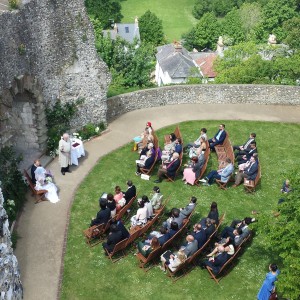
by Michael | Nov 12, 2015 | Blog
I’ve often been asked how I came to be a Civil Celebrant.
I never had any ambition to do such work. (In fact, three years ago I didn’t even know what one was!)
I only heard about it by chance.
If I’m absolutely honest, it all came about because I was interested in 400 prostitutes!
Now don’t get me wrong, please. I may be an active man, but not in the way you may be thinking!
I innocently went to hear a talk by somebody who had considerable experience with prostitutes. He had made a fortune many years back by selling answering machines to a niche market nobody had tapped before: prostitutes!
After the presentation, I had a chat with him, and it turned out that he was now a celebrant.
He told me that he helped people who wanted a ceremony that was bespoke – not formulaic. He worked with them to construct a ceremony that would mean the most to them (and, hopefully, their guests). It could be religious, semi-religious, non-religious – anything. It could be held anywhere – perhaps a licensed religious building, a hotel, a beach or a mountain top.

The ceremonies included weddings (straight or gay), vow renewals, naming blessings and handfastings. (Not to mention funerals.)
Anyway, as I listened to David, I got drawn in. This was something different, this was exciting, this was something I could do well (I have considerable experience as a public presenter) and something that would enable me to make a difference to others.
When could I start?!
Well, I trained late in 2012, and was sufficiently enthused that I then decided to train to become a funeral celebrant. I’m now almost three years down the celebrantt line, and loving it!
Who’d have thought that 400 prostitutes would have made such a difference in my life!
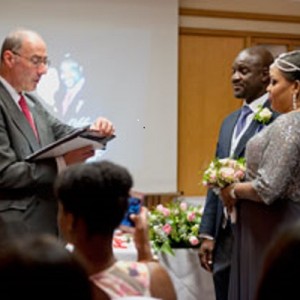
by Michael | Aug 25, 2015 | Blog
There is no reason why life-cycle ceremonies should be confined to the young. Those who are young at heart (or who actually admit to being “more mature”) can enjoy the benefits too.
Weddings
Why marry at a later age?
- To ‘live a bit’ before having a family
- to establish a career first
- to be sure the relationship will work
- to have another go (remarriage after divorce or death)
- as a gay couple, to convert their legal status
Should it be different from a younger couple’s wedding?
In practice, a wedding (civil or religious) can be the same for any couple (but please note that I would not expect any two civil weddings I conduct to be identical!).
Age may dictate a few differences – some more subtle than others:
- the mature couple may prefer a smaller ceremony, especially if they have already experienced a big first wedding
- the mature couple may now have their own families, and want to involve them
- they may prefer more age-specific readings
- a mature wedding may be more fun! There’s less likely to be family pressure, so they can choose what they want to include and whom to involve – they can dictate ceremony tone and content, clothing, celebrant, venue and guests
- a mature couple may not want wedding presents – instead, people can be given the opportunity to contribute to a charity of the couple’s choosing
- a ritual like “jumping the broom” may not be advisable for less sprightly people!

Vow Renewals
For a full discussion about Vow Renewals (why have one and how to mark it), please click on this blog link.
Vow Renewals have deservedly been gaining in popularity. Like weddings (see above), the couple nowadays has tremendous freedom of choice. Their event can reflect their personality, beliefs and wishes, so is often unforgettably unique. Of course, a good civil celebrant’s suggestions and advice will be invaluable in putting this together.
So a more mature couple should not feel deterred by age or even infirmity. The choices are out there – a small or large ceremony, religious, non- or part-religious, in a back garden, hot air balloon, dining room, castle etc., formal or less so, intimate or large-scale. The important thing is for the couple to choose what they are happy with so that they can enjoy a memorable and meaningful special day.
Then they can show those young whippersnappers a thing or two!

by Michael | Jul 28, 2015 | Blog
Who’d have an outdoor ceremony? Especially in the UK!
In the past few weeks of so-called summer, London has enjoyed (if that’s the right word!) temperatures in the high 30s and also spells of torrential showers with maximum temperatures below 20 degrees. I guess I’m rather relieved that I didn’t have an outdoor ceremony to conduct in that period!
So does that mean that you shouldn’t even consider an al fresco ceremony?
The weather cannot be predicted in the UK – or virtually anywhere else, for that matter. (Let’s ignore the Atacama Desert, etc., for the purposes of this article.) So outside is always going to be a gamble. Is that a reason not to hold such a ceremony, then?
Advantages
- One reason to hold a ceremony outdoors is that you can save money. You still have to get permission and pay the appropriate fee (unless you’re using a back garden), but this may well cost less than booking a hotel or restaurant.
- You may have a particular attachment to a certain place – maybe you first met or got engaged there. One Vow Renewal I led took place beside a canal for the simple reason that the couple were canalboat addicts.
- If it all comes together, there is a wonderful, unique atmosphere about being outside, especially if the setting is special.
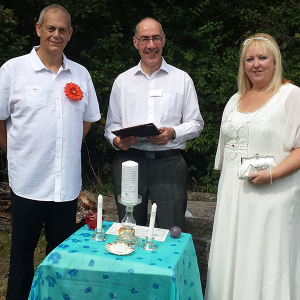
Precautions
Things can go wrong (indoors as well as out), but the main thing to prepare for when outdoors is the weather.
Every venue is different, but if you have a courtyard, say, with a portico, then that offers guests refuge from rain or strong sun. Job done! However, you will still have to consider protection for yourselves and the celebrant in the event of extreme conditions.
The bride will have to consider her footwear, if there’s heavy rain about, and her train, if she has one. Wind can play havoc with her hair, veil and dress.
Parasols or golf umbrellas may be worth investing in, if people are likely to be in exposed places for long. And if you actually get a hot and sunny day, then arrange for water to be available for guests and also for yourselves and your celebrant.
Finally, if the weather is likely to be really cold, then invest in some blankets, at least for older people.
One of the other things you will have to take into account is sound projection. Are you going to need a PA system? How big a ceremony is it likely to be? If you need a sound system, your civil celebrant or possibly whoever is providing music for later may be able to supply one, but you’ll have to investigate.
Some of the most enjoyable ceremonies I have officiated at have been outdoors, but I have not appreciated reading from my script beneath pouring rain! And as for being pursued by an aggressive wasp during the ceremony …!
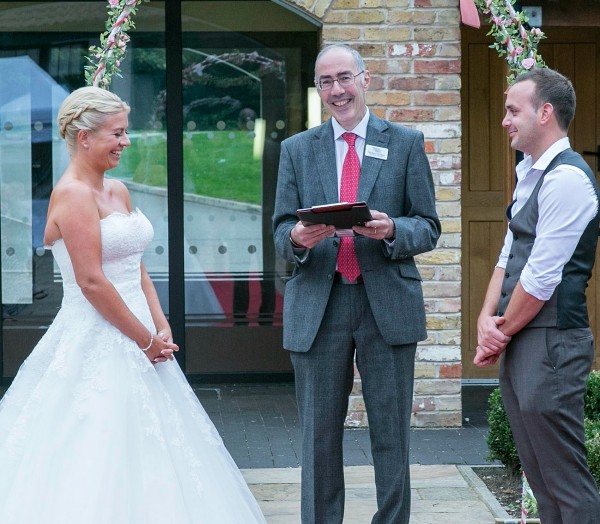
by Michael | Jul 7, 2015 | Blog
I do appreciate that not everyone understands what I offer. Although there have been civil celebrants in this country for more than fifteen years to my knowledge, there is still widespread ignorance about our role and the benefits that we can provide.
To clarify things, I’d like to focus on three ceremonies I created and performed in the not-too-distant past. I’d like to think that these will shed light on what is on offer and even give you some food for thought.
Handfasting
Imagine holding an open-air wedding ceremony on an Iron Age hill-top fort!
That’s what Annie and Ross organised. They were an interesting pairing: she was pagan and he was half-Jewish. They asked me to put together a ceremony that would reflect both religions. A challenge I enjoyed rising to!
As soon as they had done the legal bit in Salisbury Register Office they, and their entourage, headed up the hill to where I, in my robes, and my table was awaiting them.

After a welcome, explanations were offered before each ritual.
The Jewish part involved the bride circling the groom seven times while he read out certain traditional statements (in English) about a “woman of valour”. He also broke a glass underfoot at the end to the traditional cries of “Mazal tov!”.
The pagan parts included charging the circle, summoning the elements of nature, drawing down the God and Goddess, reciting handfasting vows, and drinking from the Loving Cup.
A very special occasion.
Canalside Vow Renewal
Another happy outdoor ceremony took place at Basingstoke Canal Centre.
C. and S. were celebrating 25 years of marriage and had invited friends and family to their beloved canalside location. It was hot and humid – indeed, it cannot be claimed that we remained totally dry, but nobody minded.

We convened in a grove with benches arranged in a semi-circle. I brought a table and unity candle and off we went. One highlight was the personal celebrant address, which touched on some of the events – happy and a few sad – over the thirty years the couple had known each other. Some favourite songs were played. A simple, cheerful, yet moving ceremony was the outcome.
Wedding Blessing
A completely different setting was the prestigious British Medical Association House in the heart of London. The couple had requested the legal ceremony (with the registrars) before my turn came to bless them. In contrast to the formality of the first part, this was more relaxed and although some beautiful, memorable words were spoken, smiles and even laughter were an integral part of the proceedings (even before the wine in the Loving Cup was shared!) and all went away to the reception more than satisfied with the formalities.
I hope this gives a flavour of the variety of ceremony that a Civil Celebrant can offer. I would certainly be happy to answer any questions this article may give rise to.
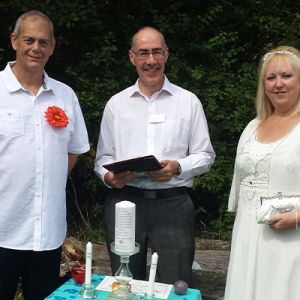
by Michael | Jun 23, 2015 | Blog
They say that you have to work at most things, but especially at marriage. If you doubt that, just look at the divorce rate. Many people believe that, once their marriage is ‘established’ – perhaps ten years old – there’s no more need to work at it.
Wrong!
Of course, you may have a freak marriage, where relationships are almost always smooth and harmonious, but reality tells us that that is almost never the case. There’s always something – whether it be stress from work, children, finances, health, annoying personal behavior or tics, other family members and so on. Any of these can put enormous pressure on a marriage.
If you are with me in acknowledging these risks to your relationship, what steps can you take to ensure that you remain a team?
Romance
One of the first things that go in a relationship is romance. Once you’ve hooked your spouse, you probably take your foot off the gas. Priorities change. You may well begin to take each other for granted.
To put that right, you may be able to make some sort of sacrifice for your partner, which may well give the right message that you still care.
The odd romantic gesture – be it flowers, a meal out or even a love message on a card – can make a real difference, and say “I do still value you”. Making time to share some fun moments together is invaluable, and leads nicely on to my next point.
Disputes
If there are areas of contention (and which relationship is without any?), then it is important to bring them out into the open, sooner rather than later, otherwise they may fester. Feelings then can run so deep that it may be impossible to save the relationship.
Mediation may be an option, whether via a relative or friend or professionally.
Humour
There are always going to be differences of opinion and mutual respect is essential here. Some issues will need to be worked out, but others can be resolved before they escalate. Humour is very often the catalyst for a happy solution, and far more likely to help than finger-pointing and accusations.
You can laugh at mistakes, make fun of yourselves – but the smiles and jokes should be affectionate, never aggressive.
Last-ditch attempts
Of course, if counselling does not work, rather than resort to divorce, a solution might be to try a period of separation. This can free partners from what might be the suffocation of too much time together – and they may begin to appreciate what the other brings to the relationship, when away from it.
Alternatively, separation can be less dramatic and merely take the form of doing pastimes or activities, or visiting friends, apart, on a regular basis.
Re-cement the Relationship
There are a lot of reasons to have a Vow Renewal ceremony.

For example, the vows you shared at your wedding may now be a distant memory; if your relationship has gone through a rocky time, why not declare to the world that you are well and truly together again; maybe you married abroad and friends or relatives never had a chance to be with you originally; you may want to declare your bond in front of children and even grandchildren. Either way, it is a beautiful ceremony that you can arrange just the way you want. A civil celebrant will be able to advise and guide you.
So be aware that a marriage is a very special relationship. Yes, it has to worked at (as do all relationships), but success is attainable and oh, so worthwhile!
Good luck with it – but remember that it is in your hands to make your own luck!







